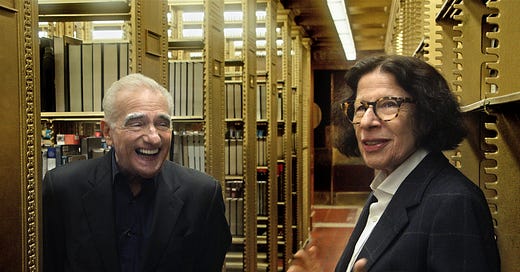When Martin Scorsese isn’t creating his own films or making heart eyes at Fran Lebowitz, he’s lamenting the rise of “content” as a stand-in for cinema. While it’s no surprise that art being reduced to a commodity would rankle an auteur like him, it’s also not lost on the average viewer that the increase in quantity is diluting the quality and variety across all streaming services.
As a bridge between the generation of Fellini, Bergman, Varda, et al. and the generation that’s coming up with Netflix and Amazon as the loudest voices in the room, Scorsese’s in the unique position of seeing the forest, the trees, and the effects of deforestation. From this swirling point of view comes an essay verging on elegy that contends “the art of cinema is being systematically devalued, sidelined, demeaned, and reduced to its lowest common denominator, ‘content.’”
Content can be a dirty word and he knows it. Contrasted with the art of cinema, this dynamic pits the experimental scenes of Scorsese’s past with the precise money machine of the present. During those mid-century scenes, the bounds of the form were elastic and every new film was “talking to each other and redefining the art form on a weekly basis.” With today’s machine, there’s clear data about what’s being watched, what’s likely to be watched next, and which formulas to repeat for the next batch of “original” content. If it seems like there’s a conversation between films, it’s probably just an echo from the old franchise that’s being rebooted for today’s audience.
Despite his disdain for this trend, the streaming boom has been a boon to Scorsese and his fellow filmmakers. Netflix gave him $160 million to make The Irishman. With resources like that available to make your own art, the impetus to speak out on behalf of the industry has to come from a deep respect for the form rather than discomfort with times a-changing. His cri de coeur emphasizes the preservation of the formative films of his past, but we’d do well to apply it to the future of film and entertainment as well.
The Irishman might not be your cup of tea, Fellini might put you to sleep, and Holidate might be just what you need for an hour and a half escape. That’s OK by me, but before artificial intelligence spirals us down to a place where the only actor left is Ashton Kutcher reprising his role in Friends with Benefits (or was it No Strings Attached?) ad infinitum, it’s worth considering what kind of art environments we as an audience want to encourage in the future.
Picking a movie might feel passive, but the bots can’t crunch their numbers without us, and the audience will always have the power to raise the tide of a Moonlight or Parasite. Scorsese’s seat might be a little more gilded than ours, but he’s still in the theater, and we all care what’s on the screen.





Thank you for acknowledging Holidate, I feel seen